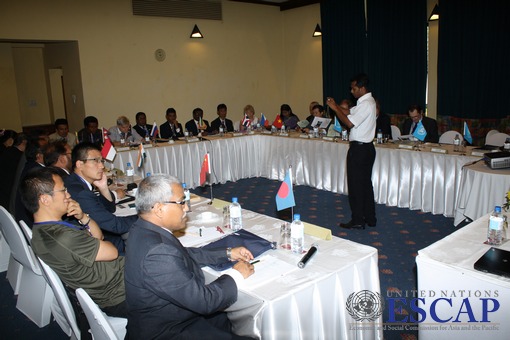3rd Sustainable Agricultural Mechanization Strategy (SAMS) Meeting, 23 October 2012, Kandy, Sri Lanka

The 3rd Sustainable Agricultural Mechanization Strategy (SAMS) meeting held in Kandy Sri Lanka 23 October 2012 shared country findings from Bangladesh, China, India, Indonesia, Malaysia, Mongolia, Papua New Guinea, the Philippines, Russian Federation, Thailand, Sri Lanka, and Viet Nam based on the SAMS Pillar 1 outline developed and agreed upon at the 2nd (SAMS) meeting held in Bangkok 17 May 2012. The May meeting called on country experts in the area of agricultural mechanization to gather information on from their respective country ministries from seven key areas as follows:
- 1. General data
- 2. Existing agricultural practices
- 3. Machinery supply chains
- 4. Policies that are relevant to/cover SAM
- 5. Institutional linkages (intra-, inter-) SAM related
- 6. Existing human capacity for SAMS
- 7. Emerging innovative schemes with implications for SAMS
Presentations given at the 3rd SAMS meeting and country papers prepared and submitted prior to the latest meeting revealed for the most part, an Asia-Pacific region that is rapidly mechanizing as people in many countries move away from the countryside in search of better economic opportunities in urban areas. Agricultural mechanization has brought about increased farm productivity and has allowed the sector to keep pace with rising food demand despite an ongoing loss of human labour linked to rural to urban migration. The region is now a prime consumer of agricultural machinery and manufacture with countries such as China, India and the Russian Federation taking the lead.
However, while most of the region is mechanizing, some countries are still reliant on human labour and have large rural populations. As demonstrated at the meeting, these countries continue to practice multiple cropping that is much more agro-biodiverse than countries that have moved up the agricultural mechanization ladder. In general, as a country mechanizes, crop production is simplified toward monocropping so that commercially viable machinery can be used.
Dr. Rosa Rolle, Senior Agro-Industry and Post-harvest Officer, FAO Regional Office for Asia and the Pacific noted that sustainable agricultural mechanization is of growing importance for countries in the Asia-Pacific region particularly in light of urbanization, aging farming populations, and the increasing feminization of agriculture. Environmentally sound agricultural machinery will, therefore, play an increasingly important role in filling labour gaps and in improving efficiency in agricultural systems across the region to cope with rising demand for food.
Dr. Ravi Ratnayake, Director of Trade of Investment Division of UNESCAP, in his remarks on SAMS offered that amid rising food prices and climate change, renewed emphasis has been put on sustainable agricultural development for food security and conservation of the environment. Sustainable agricultural mechanization will achieve the dual goals of increasing food productivity against the background of rapid population growth, reduction of rural labor as a result of urbanization and dwindling natural resources, and reducing the impact on the environment.
Thus the 3rd meeting on SAMS also called upon countries to share innovations that have implications to SAMS. These innovations included conservation agriculture practices, advancement of precision agriculture and smart farming, innovative machinery, payment of environmental services adapted to the agricultural sector, and carbon credits for no-till agriculture.
It is these emerging innovations that can serve countries looking to avoid the mistakes that other countries had made in mechanizing their agricultural production in the past.
The presentations and papers shared at the 3rd SAMS meeting will be reviewed, analysed and developed into a joint CSAM[1] and FAO publication to be released by late 2013. FAO, a key partner in SAMS, also expressed its strong long-term commitment to SAMS and looked forward to deepening its collaboration with CSAM.
[1] The United Nations Asian and Pacific Centre for Agricultural Engineering and Machinery (UNAPCAEM) has been renamed to Centre for Sustainable Agricultural Mechanization (CSAM) effective 1 October 2012.
